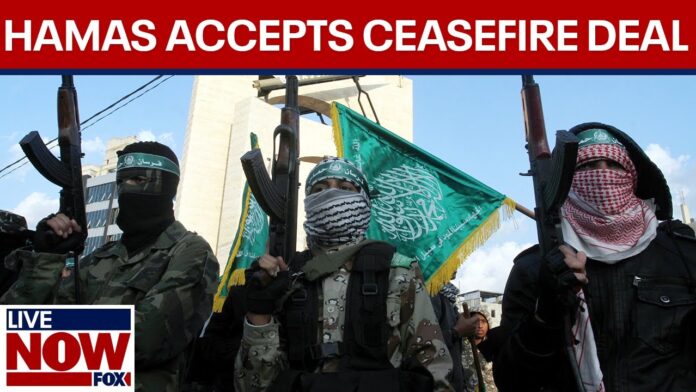Palestinians celebrate in Rafah as Israel vows to continue attacks, raising uncertainty around the ceasefire’s implementation
Palestinian group Hamas has agreed to an Egyptian-Qatari truce proposal designed to cease hostilities between Hamas and Israel in Gaza, but Israel expressed reservations, indicating the deal did not meet its requirements. Despite this, Hamas announced its acceptance of the proposal in a move that surprised many observers and brought celebrations to the streets of Gaza. This truce plan aims to bring an end to a nearly seven-month war that has claimed at least 34,700 Palestinian lives and devastated the Gaza Strip. The plan includes phased exchanges of captives held by both sides, reconstruction efforts, and the gradual withdrawal of Israeli forces.
The international response has been mixed. The U.S. government remains non-committal, with officials from the White House and State Department withholding their opinions until they have fully reviewed the situation. In the meantime, Qatar and Egypt are urging further negotiations to cement the terms of the truce. On the ground, Israeli Prime Minister Benjamin Netanyahu’s government appears divided between factions seeking continued military action and those advocating for a resolution that prioritizes the safe return of Israeli captives. With intense Israeli air strikes persisting, Rafah remains a focal point as Israeli forces push further into the city, while Hamas prepares for ongoing diplomatic and military challenges.
Al Jazeera
Al Jazeera highlighted how Hamas agreed to the Egyptian-Qatari ceasefire proposal, which would unfold in three phases over 18 weeks. In the first phase, Hamas will gradually release 33 captives, prioritizing women, the elderly, and children, while Israel will pull back its troops from Gaza’s densely populated areas. As part of the deal, Israel would free 30 Palestinian prisoners for each civilian hostage released by Hamas, with additional ratios set for military personnel.
The second phase entails a full Israeli withdrawal from Gaza and a more comprehensive prisoner exchange involving soldiers. The final phase, involving three to five years of reconstruction, promises to lift Israel’s long-standing blockade on the enclave.
Despite these optimistic steps, Al Jazeera emphasized Israel’s continued strikes in Rafah, pointing out Netanyahu’s firm commitment to pressing forward with military action against Hamas. His war cabinet unanimously agreed to intensify operations in southern Gaza, while National Security Minister Itamar Ben-Gvir dismissed the proposal as a “ruse” designed to make Israel look like the party unwilling to negotiate. Protests have broken out in Tel Aviv, with families of the hostages demanding the government accept the deal. Meanwhile, celebrations erupted in Gaza as Palestinians envisioned an end to the prolonged conflict, even though many remained wary of Israeli retaliation.
BBC
The BBC’s Jeremy Bowen presented the ceasefire proposal as a turning point that caught Israeli officials off guard. Israel’s working assumption had been that Hamas would not accept the “exceptionally generous” ceasefire terms, which is why Israel had prepared an offensive against eastern Rafah at first light. Bowen pointed out that Netanyahu’s government is under pressure from ultra-nationalists who insist on a complete occupation of Rafah. However, these demands are at odds with the mounting pressure from hostage families and international actors, including the United States.
According to Bowen, Netanyahu must navigate between conflicting factions, balancing demands from his ultra-nationalist coalition partners and the need to maintain U.S. support ahead of a pivotal election year. President Biden’s strong support for Israel is strained due to the high civilian toll in Gaza, while Hamas continues to put political pressure on Netanyahu. Should the U.S. push him to accept the truce, Netanyahu would be forced to choose between his political survival and aligning with Biden’s diplomatic stance.
Reuters
Reuters reporters Mohammed Salem, Nidal Al-Mughrabi, and Ari Rabinovitch provided a comprehensive analysis of the unfolding truce, noting that while Hamas accepted the proposal, Israel remains committed to its Rafah offensive. Netanyahu’s office acknowledged the terms do not meet Israel’s demands, but Israel would still send a delegation to Cairo for further negotiations. An unnamed Israeli official criticized the Hamas-approved deal as a watered-down version of Egypt’s proposal.
The U.S. State Department spokesperson Matthew Miller assured that a deal is “absolutely achievable,” despite Israel’s scepticism. Reuters noted over 34,600 Palestinians have died in the conflict, with U.N. agencies warning of imminent famine across Gaza. The news agency highlighted Israeli strikes in Rafah that killed several civilians, while Israeli officials believe dozens of hostages remain held in the city. Displaced families expressed frustration at their fourth relocation in seven months, while Jordan’s King Abdullah directly urged Biden to intervene and prevent further civilian casualties
